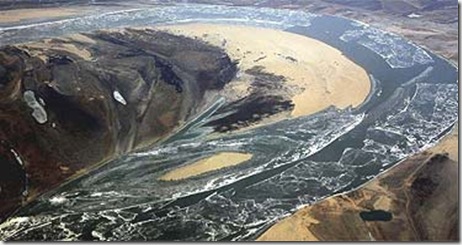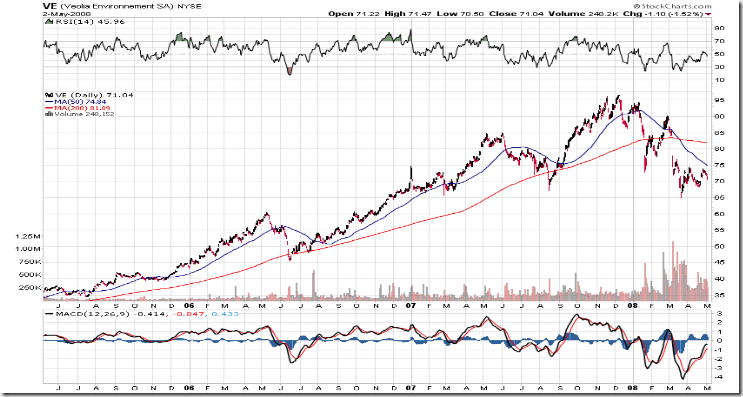Invest in Water it is the new Oil
I was working recently in Lisbon in Portugal and was talking to some of the locals about the weather,being from Scotland I was looking forward to some of the Lisbon sunshine and warm temperatures.Unfortunately for the three days that I was there the weather was similar to my native Glasgow- wet and windy. The locals had commented that they had a lot of rain so far this year but not enough to make an impact on water prices.
Now being from Scotland as I mentioned it is strange to me that people pay for water usage-in Scotland we pay a local tax for sewerage and treatment facilities but not the amount of water that we use.What struck me as I thought about it was the wastage that there is in countries like Scotland compared to other countries in the world where water is a much scarcer commodity. Loch Katrine which supplies most of Glasgow's water has a capacity of approx 64.6 million litres and is regularly topped up by the Scottish Weather. 
Listening to my colleagues in Lisbon I realised that we could do a lot more such as not having the tap running constantly when brushing our teeth and not using running hot water to do dishes .These practices are fairy common in Scotland but in other parts of the world would be considered crazy and wasteful. We are in the privileged position in Scotland( but not all of the UK where some areas do suffer from droughts and water restrictions) of not having to worry about a plentiful supply of clean water.In the rest of the world it is a very different story. The world's immediate need for fresh water remains paramount.
Loch Katrine: Scotland
In China, for example, two out of every three major cities have less water than they need. Cities in northeast China have roughly six years left before they run completely dry.
A recent report on the water situation in China says up to 300 million people are drinking contaminated water every day, and 190 million are suffering from water related illnesses each year. If air pollution is not controlled, it says, there will be 600,000 premature deaths in urban areas and 20m cases of respiratory illness a year within 15 years.One third of the length of all China's rivers are now "highly polluted" as are 75% of its major lakes and 25% of all its coastal waters. Nearly 30,000 children die from diarrhoea due to polluted water each year
Although China is the world's fourth largest economy, growing 10% a year and closing rapidly on the US, Japan and Germany, its environmental standards are often closer to those in some of the poorest countries in the world, says the report. More than 17,000 towns have no sewage works at all and the human waste from nearly one billion people is barely collected or treated. Nearly 70% of the rural population has no access to safe sanitation.
 "A majority of the water flowing through China's urban areas is unsuitable for drinking or fishing. Some 300 million people drink contaminated water on a daily basis," says the report.
"A majority of the water flowing through China's urban areas is unsuitable for drinking or fishing. Some 300 million people drink contaminated water on a daily basis," says the report.
Although China has tried to improve its air quality, it has not invested enough to keep up with the flood of people to its cities, many of which have some of the worst pollution in the world. The burning of more than 2bn tonnes of the dirtiest coal a year is costing the economy the equivalent of 3-7% of GDP (£8-15bn a year), according to the report. While no specific figure is given for the overall cost of China's pollution, in 2004 it was thought to be in the region of £32bn.
Songhua River in Harbin China
The report estimates that 27% of the landmass of the country is now becoming desertified. Much of the country already suffers from water shortages, but the Chinese Academy of Sciences expects water demand to increase by nearly 50% in the next 40 years. Industry's share of this is expected to grow from 16% to 41%.
Low environmental standards are now making people wary of buying Chinese goods, said Lorents Lorentsen, OECD's environmental director in Beijing yesterday. "If you have a reputation for being a polluted country, then you have a bad trademark abroad. It's very hard to sell pharmaceuticals, to sell food and feed from a country that has a reputation for being polluted," he said.
A lot of westerners, however, take water for granted. We simply turn on the tap and it flows. But that's certainly not the case the world over. And from they way things are looking, that may not be the case here much longer. Lakes around the U.S. are running dry. In the West, we see this happening at Lake Mead. In the East, it's Lake Lanier.
While it may not be traded in Chicago, water is a commodity. When scarce, it's the one commodity even more valuable than oil or gold.So when Big Oil starts pouring money into water rights and alternative energy, we want to pay special attention. We tend to believe that water rights will be valued in this century much as oil rights were in the last.
Companies that invest in cleaning up water I believe will do well in the years to come as the world realises that it has to do more to ensure clean drinking water for all.Countries like China are a huge market for these companies.
 One of my favourite stocks in this area is Veoila Environment (NYSE:VE) they are a a world leader in environmental services and stand to do well out of the shortage of clean water in the future.
One of my favourite stocks in this area is Veoila Environment (NYSE:VE) they are a a world leader in environmental services and stand to do well out of the shortage of clean water in the future.
We can see from the chart that the trend is most definitely up but there has been a pullback since the beginning of the year which may present a good buying opportunity.
Best Wishes
Alan

|